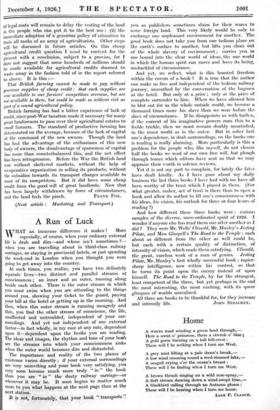A Run of Luck
TIJAT an immense difference it makes ! More especially, of course, when your ordinary external life is drab and dim—and whose isn't sometimes ?- when you are travelling about in third-class railway carriages, or staying in provincial hotels, or just spending the week-end in London when you thought you were going to 'get away into the country.
At such times, you realize, you -have two delicately separate lives—two distinct and parallel streams of consciousness ; an inner and an outer, running along beside each other. There is the outer stream in which you must swim when you are attending to the things around you, showing your ticket to the guard, paying your bill at the hotel or getting up in the morning. And then, when this outer stream is running meagrely and thin, you find the other stream of conscience, the life, unaffected and untroubled, independent of your sur- roundings. And yet not independent of one external factor—in fact wholly, in my case at any rate, dependent upon it—dependent upon the books you are reading. The ideas and images, the rhythm and tone of your book are the streams into which your consciousness sinks when the outer world becomes.dim and distasteful.
The importance and reality of the two planes of 'existence varies directly ; if your external surroundings are very uninviting and your book very satisfying, you very soon become much more truly " in " the book than you arc " in " the' dusty railway carriage—or wherever it may be. It soon begins to matter much more to you what happens at the next page than at the next station: It is not, fortunately that your book " transports ". you as publishers sometimes claim for their wares to some foreign land. This very likely would be only to exchange one unpleasant environment for another. The good book does not take you from one tedious place un the earth's surface to another, but lifts you clean out of the whole slavery of environment ; carries you in one bound into the clear world of ideas, the one world in which the human spirit can move and have its being, unshackled of circumstance.
And yet, we reflect, what is this boasted freedom within the covers of a book ? It is true that the author can make us free and independent of the tedious railway journey, unscathed by the conversation of the bagmen at the hotel. But only at a price ; only at the price of complete surrender to him. When we have allowed him to blot out for us the whole outside world, we become a thousand times more his slave than we were before the slave of circumstance. If he disappoints us with bathos, if the current of his imaginative powers runs thin to a feeble trickle, then we must remain doubly unsatisfied, in the inner world as in the outer. But in sober fact one's dependence, in drab surroundings, on the books one is reading is really alarming. More particularly is this a problem for the people who, like myself, do not choose half the books we read of our own free will, but plough through tomes which editors have sent us that we may appraise their worth in solemn reviews.
Yet it is not my part to complain, for lately the fates have dealt kindly. As I have gone about my daily business the last three books I have had with me have all been worthy of the trust which I placed in them. (For what greater, rasher, act of trust is there than to open a book and allow its author to fill one's consciousness with his ideas, his vision, his outlook for three or four hours of reading ?) And how different these three books were : curiou3 samples of the diverse, unco-ordinated spirit of 1926. I wonder if anyone else has read them one after another as I did ? They were Mr. Wells' Clissold, Mr. Huxley's jesting Pilate, and Miss Glaspell's The Road to the Temple : each about as different from the other as well could be, but each with a certain quality of distinction, of intensity of vision, which made them satisfying. Clissold, the great, careless work of a man of genius. Jesting Pilate, Mr. Huxley's first wholly successful book ; rapier- sharp intelligence, now within his control, so that he turns its point upon the enemy instead of upon himself. The Road to the Temple, by far the strangest, least competent of the three, but yet perhaps in the end the most interesting, the most exciting, with its queer glimpses of worlds unrealized.
All three are books to be thankful for, for they increase






























































 Previous page
Previous page